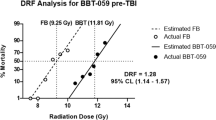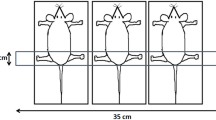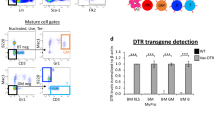Abstract
DURING work dealing with the heterotransplantation of hyperdiploid (E/Dipl) and hypotetraploid (E/Sto) variants of Ehrlich's ascites tumour into rats exposed to total-body X-ray irradiation1, I established a difference in the effect of the same inoculum of these two variants of Ehrlich's ascites tumour on the survival of rats. The effect of the tumour of these two variants previously irradiated with a lethal dose of 12,000 r. and implanted into rats exposed to total-body irradiation has been found to be of a much smaller degree, there being a difference in the effect of the two tumour variants.
This is a preview of subscription content, access via your institution
Access options
Subscribe to this journal
Receive 51 print issues and online access
$199.00 per year
only $3.90 per issue
Buy this article
- Purchase on Springer Link
- Instant access to full article PDF
Prices may be subject to local taxes which are calculated during checkout
Similar content being viewed by others
References
Klímek, M., Neoplasma, 8, 3 (1961).
Drášil, V., Neoplasma, 8, 2 (1961).
Revesz, L., J. Nat. Cancer Inst., 25, 5, 1041 (1960).
Author information
Authors and Affiliations
Rights and permissions
About this article
Cite this article
KLÍMEK, M. Effect of Lethally Irradiated Cells on the Development of New-Born Rats. Nature 193, 996–997 (1962). https://doi.org/10.1038/193996a0
Issue Date:
DOI: https://doi.org/10.1038/193996a0
Comments
By submitting a comment you agree to abide by our Terms and Community Guidelines. If you find something abusive or that does not comply with our terms or guidelines please flag it as inappropriate.



